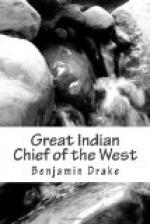The following anecdote of a Sioux chief, and of a council held by Governor Cass, some years since, for the purpose of making peace between the Sioux and Chippeways, is drawn from a letter from that officer, to the war department.[16]
“Some years since, mutually weary of hostilities, the chiefs of both nations met, and agreed upon a truce. But the Sioux disregarding the solemn compact they had formed, and actuated by some sudden impulse attacked and murdered a number of Chippeways. The old Chippeway chief was present at the time, and his life was saved by the intrepidity and self-devotion of a Sioux chief. This man intreated, remonstrated, threatened. He adjured his countrymen, by every motive, to abstain from any violation of their faith: and finding his remonstrances useless, he attached himself to the Chippeway chief, and avowed his determination to save him or perish. Awed by such intrepidity, the Sioux finally agreed that he should ransom the Chippewa. This he did at the expense of all the property he possessed. The Sioux chief now accompanied him on his journey, until he considered him safe from any of the parties of the Sioux, who might be disposed to pursue him.
“Believing it equally inconsistent with humanity and sound policy, that these border contests should be suffered to continue; and feeling that the Indians have a full portion of moral and physical evils, without adding to them the calamities of a war, which had no definite object, Governor Cass being at Sandy lake, offered his mediation to the Chippeway chiefs, to which they readily acceded. In consequence, a deputation of ten of their men descended the Mississippi with him.
“The Chippeways landed occasionally, to examine whether any of the Sioux had recently visited that quarter. In one of these excursions, there was found, suspended to a tree, in an exposed situation, a piece of birch-bark, made flat, by being fastened between two sticks, about eighteen inches long by fifteen broad. This bark contained the answer of the Sioux nation, to overtures which the Chippeways had made, on Governor Cass’ offer of mediation:—which overtures had been found and taken off by a party of the Sioux. So revengeful and sanguinary had the contest been between these tribes, that no personal communication could take place. Neither the sanctity of the office, nor the importance of the message, could protect the ambassador of either party from the vengeance of the other.
“The preliminaries to a peace being thus settled, the Sioux and Chippeways met in joint council—smoked the pipe of peace together, and then in their own figurative language, ’buried the tomahawk so deep, that it could never be dug up again.’”
Another anecdote is related by Mr. Schoolcraft which we quote as illustrative of the character, in some degree, of this singular and warlike race.”




